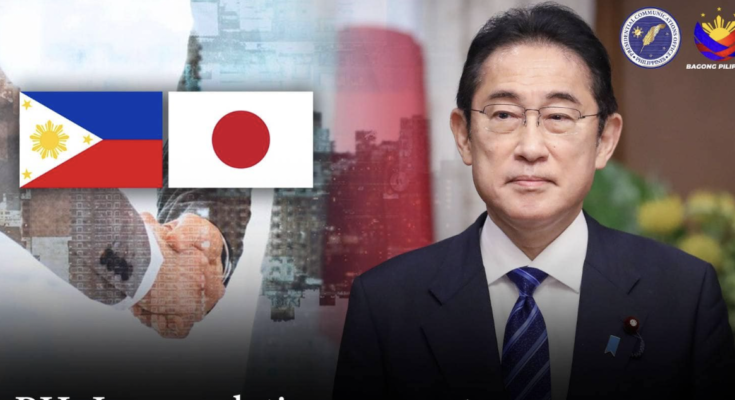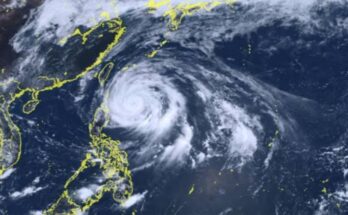MANILA – President Ferdinand R. Marcos Jr. expressed optimism on Saturday (Manila time) that the Philippines’ trilateral alliance with the United States (US) and Japan would usher in sustained peace and stability in the South China Sea (SCS).
During his meeting with US Defense Secretary Lloyd Austin III at the Pentagon in Washington DC, Marcos said the result of his historic trilateral summit with US President Joe Biden and Japan Prime Minister Fumio Kishida would provide “continuing defense” of international law amid the growing tensions in the SCS.
“We hope that this trilateral agreement, which we formalized yesterday, will be a formalization of an added multilateral support and structure that will make the safety, the peace, and the stability of the South China a reality and continued to be a reality,” Marcos said.
“I view of the new agreements, and the new partnerships and alliances that we have forged, including the trilateral agreement, not as a response to any particular challenge or threat but merely a continuing development and evolution of the relationship that we have been fostering over a hundred years.”
Marcos expressed hope that the Philippines and the US would continue to get closer, as he emphasized that the two countries have done so much work under his watch.
He said his visit to the Pentagon reaffirms the two countries’ strong relations in the face of all of the threats and challenges that confront them.
“Thank you once again for this opportunity for us to consult with you and to see what more it is that we can do in the future,” he said.
Marcos met with Austin at the Pentagon, a day after his landmark trilateral meeting with Biden and Kishida on Friday (Manila time).
In a joint statement after their trilateral meeting, Marcos, Biden, and Kishida expressed “serious” concern over China’s “dangerous and aggressive behavior” in the SCS.
The three leaders called on China to abide by the “final and legally binding” 2016 ruling that upheld the Philippines’ sovereign rights and jurisdiction in its exclusive economic zone.
‘More than allies’
Austin assured Marcos of the US’ continued support to the Philippines, emphasizing that the two countries are more than just allies.
“We’re sending our help in any way we can because as what I often said, we’re more than allies, we’re a family,” he told Marcos. “We’re gonna keep building our partnership.”
Austin said the two nations have achieved great work and cooperation, adding that their alliance “has never been this strong to strengthen interoperability between our forces and to tackle common challenges.”
He cited the two countries’ expanded operational coordination on land, sea, and air.
“This whole cooperation is critical to our collective security and continued prosperity across the region,” Austin said, reiterating Biden’s “ironclad” defense commitment to the Philippines.
Enhanced defense cooperation
Austin announced that Biden is seeking USD128 million in congressional allocation budget to execute projects for Enhanced Defense Cooperation Agreement (EDCA) sites in the Philippines.
“President Biden’s new pleasant request seeks USD128 million to execute 36 projects and enhance defense cooperation agreement size, and that would more than double the amount that we’ve invested in EDCA infrastructure,” he said.
“All these underscores the strength of our alliances further, and so I look forward to hearing your views on how we can keep working together more closely than ever, including through cooperation with like-minded partners.”
In 2016, the Philippines and the US agreed on five initial sites where both sides will construct facilities and preposition equipment.
The selection of the EDCA sites is in accordance with the Armed Forces of the Philippines’ (AFP) Strategic Basing Plan.
The identified sites are Philippine military bases that will be further developed based on the strategic requirements for the basing and development of the AFP.
Austin also said that an armed attack on the Philippines’ armed forces, public vessels, or aircraft in the Pacific, including the SCS, would invoke US defense commitments to the Mutual Defense Treaty (MDT).
The EDCA is an instrument signed between the Philippines and the US in 2014 to deepen their defense cooperation and advance the implementation of the MDT.
This will be done by addressing capability gaps, particularly in humanitarian assistance and disaster response; promoting modernization and interoperability; and helping develop maritime security and maritime domain awareness.
The diplomatic relations between the Philippines and the US span 77 years since its formal establishment on July 4, 1946.
Key deal
In a statement, House of Representatives Speaker Martin Romualdez said Marcos scored a “strategic victory” in securing the solid commitment of the US and Japan.
“President Marcos Jr.’s steadfast leadership and diplomatic initiatives significantly advanced our country’s national interests, especially in upholding our sovereignty and safeguarding our territorial integrity, particularly in the West Philippine Sea,” Romualdez said.
“The commitment of the United States and Japan to support the Philippines in defending its sovereignty and promoting regional peace is a testament to the strength of bilateral and multilateral partnerships in addressing complex security challenges.”
He reaffirmed the full support of the House for government efforts to protect the nation’s interests and in promoting peace and stability in the Indo-Pacific region. (PNA)





